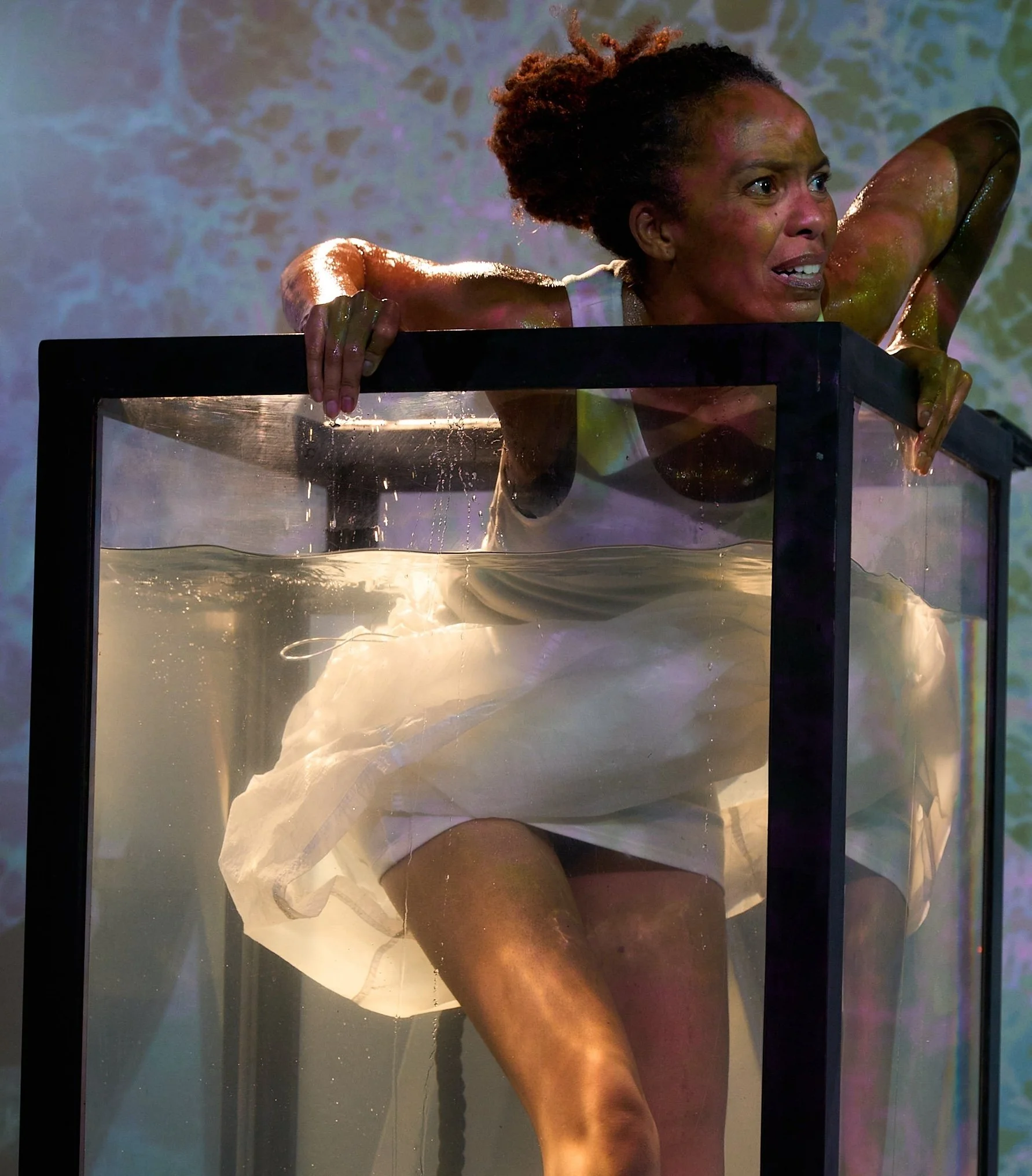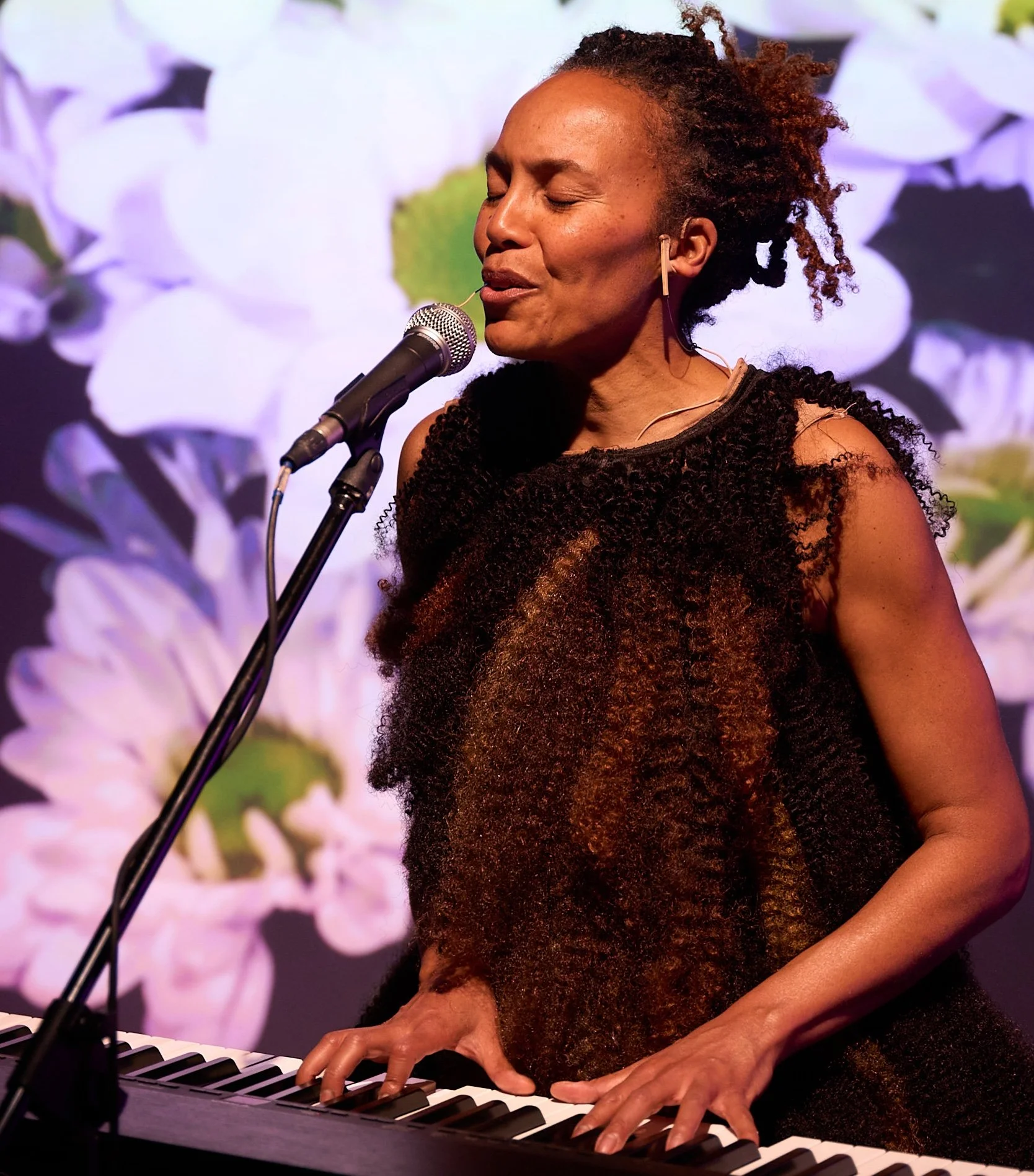Eisa Davis, composer, librettist, and performer, sings “I’m Crossin’ the Water” and plunges into a water tank in the initial scene of The Essentialisn’t at HERE Arts Center.
The Essentialisn’t is the most awkward title of the theater season so far, but never mind that. Eisa Davis’s intimate musical enfolds its spectators in the cultural recollection of the earliest Africans brought to this country and in Davis’s own search for identity through music, acting, and dance. It’s an ambitious undertaking focused on what Davis calls “personal sovereignty.” Davis, who is billed as creator, performer, and director, poses a multivalent question—“Can you be Black and not perform”—which appears in bright fuchsia neon onstage throughout the play.
Davis with the Sovereigns (Jamella Cross and Princess Jacob) and a partial glimpse of the all-important neon sign that asks, “Can you be Black and not perform?”
This 80-minute work is played on a white, uncluttered stage. The performance begins in darkness, with amplified sound of water (possibly an ocean); then projections by Skye Mahaffie (initially video of roiling waves) appear on the back wall and illuminate the tiny stage. Davis, clad in a filmy white garment, is balanced atop a very tall, very narrow water tank, an escape artist’s stage prop with transparent sides. Plunging into the drink, she sings: “I’m crossin’, I’m crossin’, I’m crossin’ the water.”
Keeping her head above the surface, Davis moves in a freeform dance (to the limited extent possible in such a narrow tank). This aquatic ballet, accompanied by the sound of waves, serves as a striking overture, evoking the lost narratives of young women torn from their native environs, transported via cruelly packed sailing vessels to a land they couldn’t imagine and futures they couldn’t foresee.
Davis’s libretto is episodic. The scenes, related in various ways, have the semi-independence of revue sketches (which, arguably, is what they are). The dialogue concerns “some of the things you think about us” and “some of the things we think about ourselves”—or, in the terms of the play’s title, what’s “essential” and “essentialisn’t” about Black women artists. The score is a trove of varied songs about Black womanhood, written and largely sung by Davis, who has an exquisite voice and lots of vocal style. (There are also sampled bits by other artists, including Mary J. Blige’s Burger King jingle and the Dream Girls anthem “And I Am Telling You I’m Not Going.”) The musical numbers pay tribute to centuries of underappreciated artistic genius among Black women. They also keep spectators’ toes tapping and torsos swaying—sometimes rocking—throughout the performance.
Davis, clad in a dress made of hair, plays keyboard and sings “There Is a Logic.” Photographs by Daniel J. Vasquez.
Jamella Cross and Princess Jacob complete the cast of three. They’re the Sovereigns, Davis’s interlocutors, first-rate back-up singers, and models of authenticity and self-possession. They’re also stagehands, shifting scenery and assisting with fast costume changes, and at times a Greek chorus.
Davis laments to the Sovereigns: “Slavery took away my story.” Surveying American history from the undatable arrival of her ancestors to now, she muses, “Where’s my narrative? … The South lost the War but won the narrative? Oh! The slaveholders are the victims? … Where’s the narrative logic?”
When Davis floats the partial equation, “Blackness minus narrative equals … ,” the Sovereigns step in, finishing the equation: “… our music.” Blackness minus narrative equals our music. Singing that music, Davis and the Sovereigns demonstrate what it means to perform without being performative.
At the end of The Essentialisn’t, Davis returns to the tank, with the symbolism of her immersion altered by what has happened during the 80 minutes of her performance on the HERE Arts Center stage.
In what may be the show’s most personal sequence, Davis muses, “The activist legacy I was born into means that you don’t see yourself as an individual first. What sort of responsibility do you feel toward our liberation as a race? There’s good performance—kindness—and then there’s performance that isn’t kind to yourself or anyone.” What she’s talking about, I believe, is the toxic temptation to “perform” in appeasement of other people’s assumptions or expectations. “When,” asks Davis, “do you feel the most comfort, ease, sovereignty in your Blackness?” The answer, whatever it may be, is this musical’s holy grail.
Shortly before Davis was born, novelist James Baldwin published an essay titled “Open Letter to My Sister, Angela Y. Davis” (referring to the distinguished scholar and social activist, who is Eisa’s aunt). In that essay, Baldwin speaks of people “assess[ing] and absorb[ing] their history, and, in that tremendous action, … free[ing] themselves of it,” ensuring they’ll “never be victims again.” Those words, though not referenced in Davis’s text, reflect the trajectory of her search and the emotional arc of The Essentialisn’t. Freedom, sovereignty—heady, essential stuff!
The Essentialisn’t, produced by HERE Arts Center in association with The Movement Theatre Company, runs through Sept. 28 at HERE (145 6th Ave.). Evening performances are at 8:30 p.m. Tuesday through Saturday; matinees at 4 p.m. Saturday and Sunday. For tickets and more information, visit here.org.
Creator, Writer, & Director: Eisa Davis
Sound Design: Rucyl Mills & Christopher Payne
Lighting Design: Cha See
Video Design: Skye Mahaffie
Scenic & Costume Consultant: Peter Born
Associate Director: Anire Amoda






